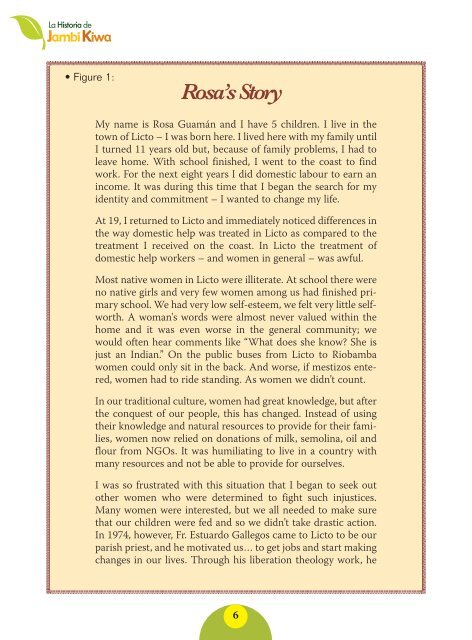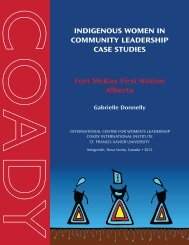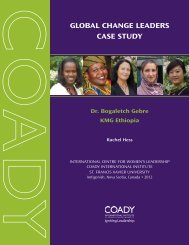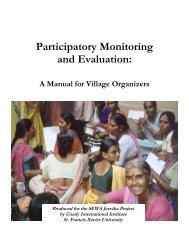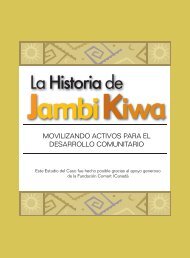Rosa's Story - Coady International Institute - St. Francis Xavier ...
Rosa's Story - Coady International Institute - St. Francis Xavier ...
Rosa's Story - Coady International Institute - St. Francis Xavier ...
Create successful ePaper yourself
Turn your PDF publications into a flip-book with our unique Google optimized e-Paper software.
• Figure 1:<br />
Rosa’s <strong><strong>St</strong>ory</strong><br />
My name is Rosa Guamán and I have 5 children. I live in the<br />
town of Licto – I was born here. I lived here with my family until<br />
I turned 11 years old but, because of family problems, I had to<br />
leave home. With school finished, I went to the coast to find<br />
work. For the next eight years I did domestic labour to earn an<br />
income. It was during this time that I began the search for my<br />
identity and commitment – I wanted to change my life.<br />
At 19, I returned to Licto and immediately noticed differences in<br />
the way domestic help was treated in Licto as compared to the<br />
treatment I received on the coast. In Licto the treatment of<br />
domestic help workers – and women in general – was awful.<br />
Most native women in Licto were illiterate. At school there were<br />
no native girls and very few women among us had finished primary<br />
school. We had very low self-esteem, we felt very little selfworth.<br />
A woman's words were almost never valued within the<br />
home and it was even worse in the general community; we<br />
would often hear comments like “What does she know? She is<br />
just an Indian.” On the public buses from Licto to Riobamba<br />
women could only sit in the back. And worse, if mestizos entered,<br />
women had to ride standing. As women we didn’t count.<br />
In our traditional culture, women had great knowledge, but after<br />
the conquest of our people, this has changed. Instead of using<br />
their knowledge and natural resources to provide for their families,<br />
women now relied on donations of milk, semolina, oil and<br />
flour from NGOs. It was humiliating to live in a country with<br />
many resources and not be able to provide for ourselves.<br />
I was so frustrated with this situation that I began to seek out<br />
other women who were determined to fight such injustices.<br />
Many women were interested, but we all needed to make sure<br />
that our children were fed and so we didn’t take drastic action.<br />
In 1974, however, Fr. Estuardo Gallegos came to Licto to be our<br />
parish priest, and he motivated us… to get jobs and start making<br />
changes in our lives. Through his liberation theology work, he<br />
6


